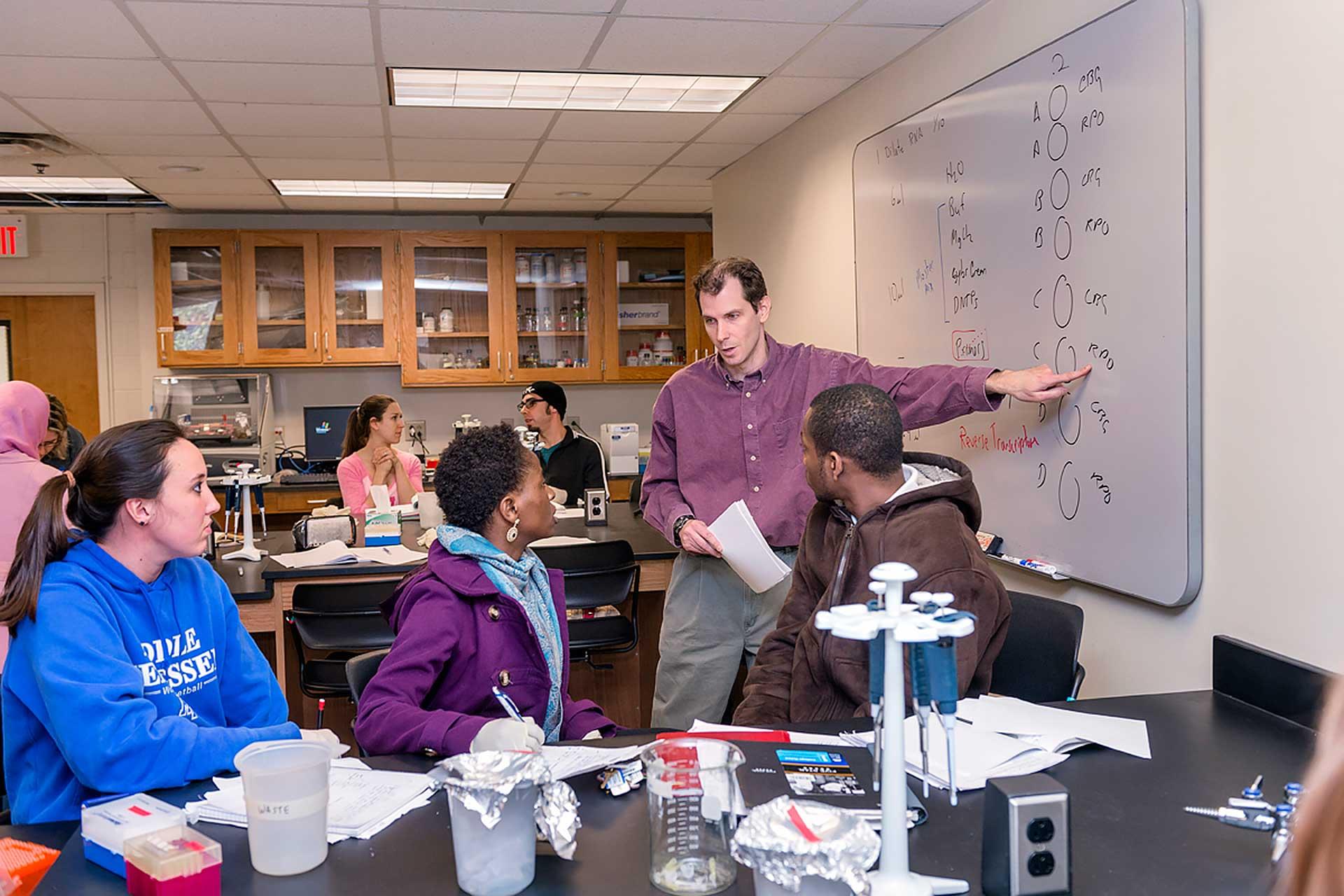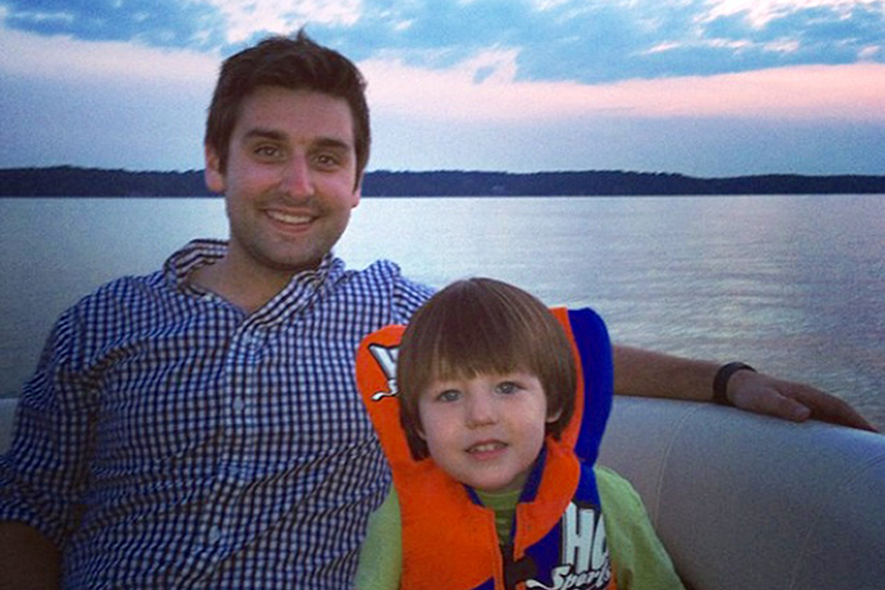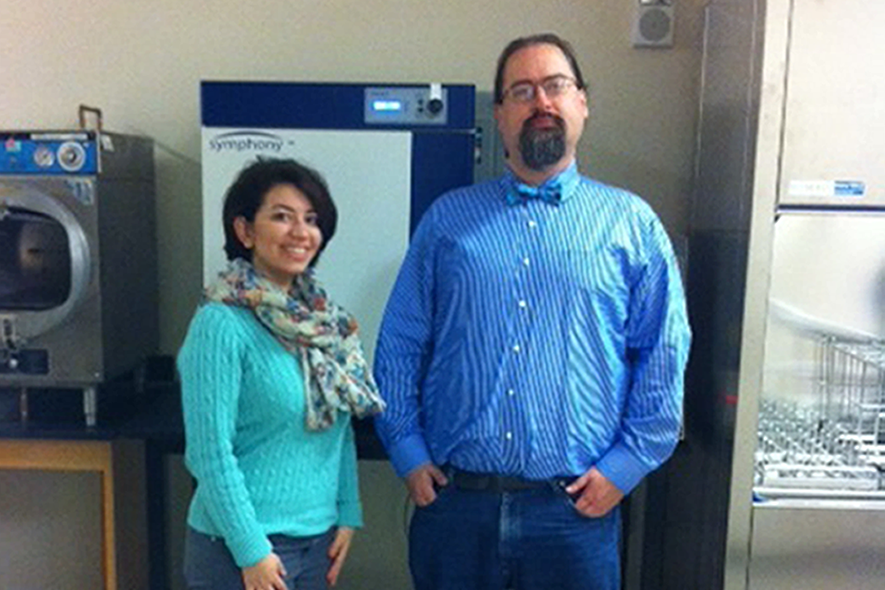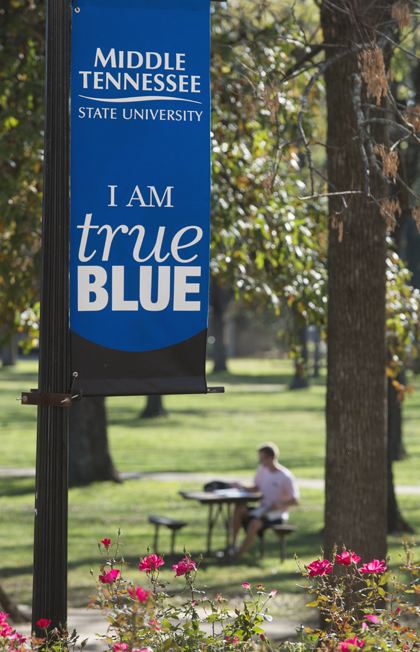
Professional Science
Launch your career in biotechnology management in a program that blends science and business.
Professional Science, Biotechnology Concentration, M.S.
The Biotechnology concentration in the Master of Science in Professional Science degree offers preparation for careers in the management of bioscience firms and organizations. The program is a combination of business and science to offer training to work in highly skilled and/or leadership roles in scientific companies and agencies.
Opportunities with this degree include research science positions solving problems in medicine, industry, and agriculture. management positions in biotechnology and pharmaceutical industries. regulatory, investigatory, or quality control roles in governmental agencies or industries. The program features job-related experience in a 250-hour internship that is completed prior to graduation instead of a thesis or comprehensive exams. Coursework includes biotech-related classes, along with a business management core. A limited number of graduate assistantships are available.
If you live in one of these states: AL; you may be able to attend MTSU at in-state rates under the Academic Common Market program.
News Briefs

Alumni find biotech jobs right out of program
Biotechnology M.S. graduate Tyler Hill was hired full-time after his internship at Advanced Breath Diagnostics and later moved into management with the pharmaceutical startup. Hill interned with scientists researching a 13-Carbon labeled algae biomass that is used as a chemical marker in a novel diagnostic breath test. "This gave me real-world, practical work experience as well as first-hand knowledge of what it is like to work in such a regulated industry," he says. Hill, a music business major until his undergrad biology class, didn't want to stay in academia but didn't want to limit his possibilities of advancement as a technician. Program alum Dr. Karen Beasley Maynard worked as a research assistant at Vanderbilt University Medical Center 18 months before beginning MTSU's Molecular Biosciences Ph.D. program. The Biotechnology program provided a "realistic timeline" and a chance to be employed quickly for the single mom of a 4-year-old. "It offered the best combination of science bench work with the skills needed to manage a lab," she says. Beasley Maynard earned a STEM master's scholarship and her graduate work resulted in a publication.

Students get variety of research opportunities
Biotechnology students get experience through lab research, teaching, and internships. Shannon Smith has worked with Dr. Rebecca Seipelt-Thiemann on genetics research, Dr. Karen Maynard on the evolutionary genetics of the M1 aminopeptidase family, and Dr. Aubrey Cahoon on plant tissue cultures. Smith helped teach genetics, will continue working with Dr. Elliot Altman during his Ph.D. research with the goal of producing economically valuable plant tissue for industry, and developed science outreach with MTSU's Center for Environmental Education during his internship. Smith will pursue the Molecular Biosciences doctorate and intends to start a plant biotech business. Mahsa Majedi, who worked in a microbiology lab after earning her bachelor's in Iran, is helping Altman and his doctoral student Ashley Elliott Cole with research related to neurodegeneration diseases. They are studying the impact of molecular chaperones to assist new and misfolded proteins to fold into their correct conformation. Both Majedi and Smith chose MTSU's program for its courses covering business aspects as well as lab techniques. The new science building and professors' different research interests give MTSU the "potential to be bigger and better," Majedi says.
News Briefs
Alumni find biotech jobs right out of program

Biotechnology M.S. graduate Tyler Hill was hired full-time after his internship at Advanced Breath Diagnostics and later moved into management with the pharmaceutical startup. Hill interned with scientists researching a 13-Carbon labeled algae biomass that is used as a chemical marker in a novel diagnostic breath test. "This gave me real-world, practical work experience as well as first-hand knowledge of what it is like to work in such a regulated industry," he says. Hill, a music business major until his undergrad biology class, didn't want to stay in academia but didn't want to limit his possibilities of advancement as a technician. Program alum Dr. Karen Beasley Maynard worked as a research assistant at Vanderbilt University Medical Center 18 months before beginning MTSU's Molecular Biosciences Ph.D. program. The Biotechnology program provided a "realistic timeline" and a chance to be employed quickly for the single mom of a 4-year-old. "It offered the best combination of science bench work with the skills needed to manage a lab," she says. Beasley Maynard earned a STEM master's scholarship and her graduate work resulted in a publication.
Students get variety of research opportunities

Biotechnology students get experience through lab research, teaching, and internships. Shannon Smith has worked with Dr. Rebecca Seipelt-Thiemann on genetics research, Dr. Karen Maynard on the evolutionary genetics of the M1 aminopeptidase family, and Dr. Aubrey Cahoon on plant tissue cultures. Smith helped teach genetics, will continue working with Dr. Elliot Altman during his Ph.D. research with the goal of producing economically valuable plant tissue for industry, and developed science outreach with MTSU's Center for Environmental Education during his internship. Smith will pursue the Molecular Biosciences doctorate and intends to start a plant biotech business. Mahsa Majedi, who worked in a microbiology lab after earning her bachelor's in Iran, is helping Altman and his doctoral student Ashley Elliott Cole with research related to neurodegeneration diseases. They are studying the impact of molecular chaperones to assist new and misfolded proteins to fold into their correct conformation. Both Majedi and Smith chose MTSU's program for its courses covering business aspects as well as lab techniques. The new science building and professors' different research interests give MTSU the "potential to be bigger and better," Majedi says.
Related Media

With the growth of positions in the biotechnology industry in Tennessee and nationwide,the demand for persons with training in both biological science and management is expected to grow significantly. Jobs may be found in agricultural, chemical, environmental and pharmaceutical research and industries. Examples of some occupations with this degree include
- Biochemist
- Bioinformatician
- Biomedical engineer
- Biophysicist
- Biotechnology/pharmaceutical sales rep
- Biotechnology lab technician
- Clinical trials manager
- Consultant
- Corporate manager
- Crime lab technician
- Environmental scientist
- Epidemiologist
- Food scientist
- Forensic scientist
- Marketing executive
- Microbiologist
- Pharmaceutical analyst
- Process development specialist
- Quality control analyst
- Quality control engineer
- Regulatory biomanufacturing specialist
- Research and development scientist
- Research associate
- Research facility director
- Senior scientist
- Technical manager
- University/research professor
Employers of MTSU alumni include
- Aegis Sciences Corporation
- Biogen Idec
- Calhoun Community College
- Columbia State Community College
- East Tennessee State University
- Emory University
- Encapsula Nanosciences
- ESC Lab Sciences
- Genetics Associates, Inc.
- McGraw-Hill Education
- Microbial Discovery Group
- Middle Tennessee State University
- Novus International
- Tennessee Valley Authority
- Unilever
- S. Department of Agriculture, Iowa
- Vanderbilt University Medical Center



- Forms
- Important Dates
- MTSU Department of Biology
- MTSU College of Business (for Business Core)
- FAQs
- PSM National

CONTACT US

Please fill in the form below and we will contact you very soon











